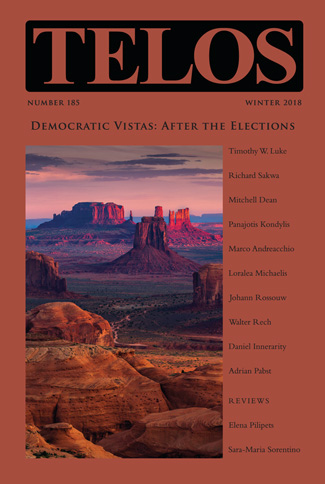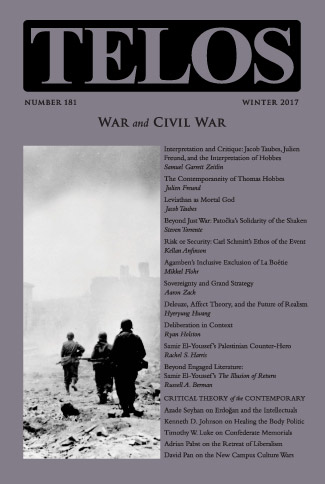By Russell A. Berman · Wednesday, December 12, 2018 Telos 185 (Winter 2018) is now available for purchase in our store. Individual subscriptions to Telos are also available in both print and online formats.
 Recall the 2016 campaign and even more the aftermath of the Trump victory: otherwise reasonable people rushed into heated rhetoric regarding the imminence of dictatorship and the end of democracy as we know it. Comparisons of the America of 2016 and Germany of 1933 proliferated, while denunciations of Republicans as Nazis or Nazi collaborators became common. It would be a worthwhile project for a student or scholar of American culture to cull through those statements and confront their authors with them today: if they were so wrong in 2016, what value is their judgment today, moving forward? Recall the 2016 campaign and even more the aftermath of the Trump victory: otherwise reasonable people rushed into heated rhetoric regarding the imminence of dictatorship and the end of democracy as we know it. Comparisons of the America of 2016 and Germany of 1933 proliferated, while denunciations of Republicans as Nazis or Nazi collaborators became common. It would be a worthwhile project for a student or scholar of American culture to cull through those statements and confront their authors with them today: if they were so wrong in 2016, what value is their judgment today, moving forward?
For those predictions were simply and utterly wrong. Of course, the Republican in the White House and the Republican-controlled Congress pursued a version of a conservative agenda (although not always with success, as in the case of health care). But the rule of law prevailed, courts could decide against the government, the liberal part of the press has been articulate in its critique of administration policies, and, in a quite normal and proper manner, the midterm elections took place. American institutions have proven much more robust than the hysterics of little faith claimed in 2016. Those prophets of dictatorship owe us an accounting—or actually an apology—for their hyperbole. They significantly trivialized what really happened under the Nazi dictatorship, and they cavalierly slandered that slightly less than half of the American electorate that voted for Trump. Time for some critical self-reflection? This is not at all a suggestion that they must endorse the president, but it is way past time for them to concede that his supporters are not a priori Nazis, no matter how much juvenile fun name-calling affords.
Continue reading →
By Paul Grenier · Friday, September 7, 2018 Are the divisions that fragment the United States primarily driven by some deep flaw in its political life, or was the United States doing just fine, thank you very much—until Russia came along during the 2016 presidential race and started sowing division and dissension?
Framed that way, the question answers itself. Whatever some state-sanctioned Russian actors may have done to pester the American political process, it is obvious that America’s deep divisions exist for reasons having essentially nothing to do with Russia. They long precede the last election.
Even if Russia’s interventions into American electoral politics turn out to be more significant than they presently appear, this cannot change the more fundamental reality that our confrontational posture, including vis-à-vis Russia, is by no means something external to the United States’ Lockean liberal political concept.
Continue reading →
By Marco Patriarca · Monday, April 9, 2018 Among the discouraging quandaries that the European Union has had to face in recent years, no one could have imagined that the United Kingdom and the United States, our historical, crucial allies, would turn their back on the EU, thus leaving it exposed to the global influence to Russia, Turkey, and Iran, not exactly friends of our open societies and polity. It would have been equally impossible to predict that so many supposedly enlightened, tolerant, and democratic European citizens would rally around xenophobic and anti-Semitic political parties while reviving the most obtuse and primitive ethnocentrism. All these ills, and most of all of Brexit and its aftermath, were interpreted by many as a fatal blow to the EU, in combination with other indicators that seemed to point to a general design failure of its unifying project. Nevertheless, many reliable commentators have expressed faith that the EU, at long last, would react to this long-standing issue.
Continue reading →
By Mitchell Dean · Tuesday, March 27, 2018 It is difficult to know what constitutes the latest social media “scandal” for the news organizations that promote it as such. Of course, it follows the seemingly unending political concerns around social and digital media since the election of President Trump and other cornerstone events such as the Brexit vote. It stands in the long line of concerns about email hacking, Russian “meddling,” “fake news,” undignified presidential tweeting, and bots, and the indictments of workers of a Russian internet agency. There is the more general, but somewhat vacuous, thesis that the “politics of truth” has been replaced by a “politics of untruth.” Within this framing, there is the sense that “democracy” is under attack through social media; that populists, the “alt-right,” shady billionaire donors, foreign authoritarians and nativist Svengalis have found secret pathways to sow discontent within Western democracies and tip elections and plebiscites to previously unconscionable leaders and unimaginable outcomes.
Continue reading →
By Jack Robert Edmunds-Coopey · Monday, March 12, 2018 As an occasional feature on TELOSscope, we highlight a past Telos article whose critical insights continue to illuminate our thinking and challenge our assumptions. Today, Jack Robert Edmunds-Coopey looks at Joseph Diaz’s “Schmitt and Marcuse: Friends, Force, and Quality” from Telos 165 (Winter 2013).
It seems necessary in contemporary critical circles to construct a history of natural histories, because the presuppositions of philosophical systems have become more and more prominent while being in need of closer investigation. Within the history of natural histories is the history of the presupposition. Joseph Diaz’s article discusses the basis of political friendship in Aristotle’s Ethics in order to contextualize the work of Carl Schmitt and Herbert Marcuse. These two thinkers existential presuppositions are perfect examples of the forms of natural histories that underpin such elaborate individual philosophical projects.
Continue reading →
By Russell A. Berman · Wednesday, December 13, 2017 Telos 181 (Winter 2017): War and Civil War is now available for purchase in our store.
 Consider the question: has American political life ever been as polarized as it is today? If the most appropriate answer is: yes, of course, in 1861, then the problem has been named and we are left with little comfort. The evaporation of anything like a bipartisan consensus in the political class leaves us staring at a battlefield, with few common bonds or shared attachments. Politics has become the internalization of war by other means. This is our version of the crisis of parliamentary democracy that Schmitt described in the Weimar years. Congressional Democrats are unwilling to cross the aisle to find room for compromise in the Trump era, but this only repeats the animosity among Republicans toward the Obama agenda eight years ago. Each party seeks its own advantage, which exclusively means the other party’s disadvantage, as the national good slips beneath the horizon. Each party focuses on mobilizing its base for votes and fund-raising, which means that each has an irresistible incentive to avoid solving those problems that are the most effective vehicles for rallying their supporters: when they held the majority, the Democrats preferred to keep the “dreamers” vulnerable, so as to be able to recycle them in future campaigns, just as the Republicans chose to punt on health care. Each issue is too successful in attracting voters, too valuable to give up. Consider the question: has American political life ever been as polarized as it is today? If the most appropriate answer is: yes, of course, in 1861, then the problem has been named and we are left with little comfort. The evaporation of anything like a bipartisan consensus in the political class leaves us staring at a battlefield, with few common bonds or shared attachments. Politics has become the internalization of war by other means. This is our version of the crisis of parliamentary democracy that Schmitt described in the Weimar years. Congressional Democrats are unwilling to cross the aisle to find room for compromise in the Trump era, but this only repeats the animosity among Republicans toward the Obama agenda eight years ago. Each party seeks its own advantage, which exclusively means the other party’s disadvantage, as the national good slips beneath the horizon. Each party focuses on mobilizing its base for votes and fund-raising, which means that each has an irresistible incentive to avoid solving those problems that are the most effective vehicles for rallying their supporters: when they held the majority, the Democrats preferred to keep the “dreamers” vulnerable, so as to be able to recycle them in future campaigns, just as the Republicans chose to punt on health care. Each issue is too successful in attracting voters, too valuable to give up.
Continue reading →
|
|
 Recall the 2016 campaign and even more the aftermath of the Trump victory: otherwise reasonable people rushed into heated rhetoric regarding the imminence of dictatorship and the end of democracy as we know it. Comparisons of the America of 2016 and Germany of 1933 proliferated, while denunciations of Republicans as Nazis or Nazi collaborators became common. It would be a worthwhile project for a student or scholar of American culture to cull through those statements and confront their authors with them today: if they were so wrong in 2016, what value is their judgment today, moving forward?
Recall the 2016 campaign and even more the aftermath of the Trump victory: otherwise reasonable people rushed into heated rhetoric regarding the imminence of dictatorship and the end of democracy as we know it. Comparisons of the America of 2016 and Germany of 1933 proliferated, while denunciations of Republicans as Nazis or Nazi collaborators became common. It would be a worthwhile project for a student or scholar of American culture to cull through those statements and confront their authors with them today: if they were so wrong in 2016, what value is their judgment today, moving forward? 


